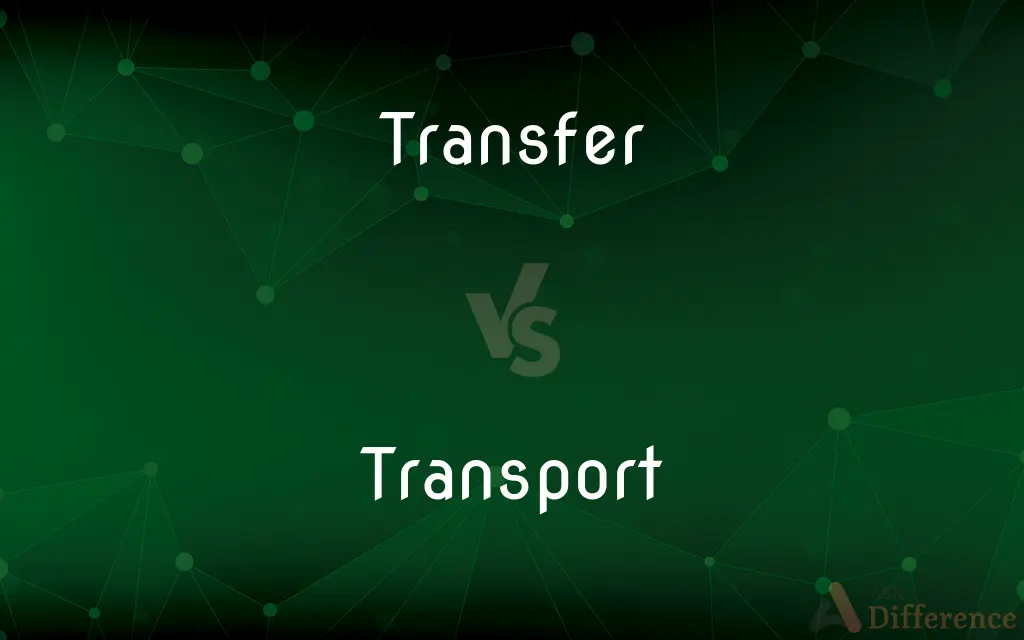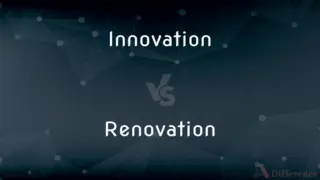Transfer vs. Transport — What's the Difference?
Edited by Tayyaba Rehman — By Fiza Rafique — Updated on February 21, 2024
Transfer involves moving something from one place to another, often implying a change of ownership or use, while transport refers to the act of carrying or moving people or goods from one location to another, focusing on the means and systems involved.

Difference Between Transfer and Transport
Table of Contents
ADVERTISEMENT
Key Differences
Transfer often implies a change in ownership or purpose as something is moved from one place or person to another. For example, transferring funds involves moving money from one account to another, often changing its intended use or ownership.
Transport, on the other hand, emphasizes the process and means of movement, such as vehicles, roads, and logistics systems. Transporting goods, for instance, involves selecting the most efficient mode of transportation, like trucks, ships, or planes, to move items from one location to another without necessarily implying a change in ownership.
Transfer can be a one-time event, such as transferring a title deed, whereas transport can be a continuous or recurring process, like the daily transport of goods across cities.
Transfers can occur without physical movement, such as transferring rights or data electronically, whereas transport inherently involves physical movement across distances.
Both transfer and transport are crucial in various contexts, from business operations to personal activities, but transfer focuses more on the change it brings to the item or information, while transport is concerned with the method and journey of moving.
ADVERTISEMENT
Comparison Chart
Focus
Change in ownership/use
Movement method/system
Nature
Can be non-physical
Inherently physical
Frequency
Can be one-time
Often continuous/recurring
Example Contexts
Funds, property, data
Goods, people
Implication
Change in purpose
Efficiency of movement
Compare with Definitions
Transfer
Moving funds between accounts.
She transferred money from savings to checking.
Transport
Moving goods by truck.
The company transports goods nationwide.
Transfer
Shifting responsibilities.
He transferred his duties to his deputy.
Transport
Shipping cargo by sea.
They transport cargo across the Atlantic.
Transfer
Relocating employees.
She was transferred to the Chicago office.
Transport
Carrying passengers by bus.
The city's buses transport thousands daily.
Transfer
Data movement.
Data was transferred between the servers seamlessly.
Transport
Cycling for commute.
He transports himself to work by bike.
Transfer
Changing property ownership.
The title was transferred after the sale.
Transport
Flying people by plane.
The airline transports millions annually.
Transfer
Move from one place to another.
He intends to transfer the fund's assets to the Treasury.
I went to sleep on the couch before transferring to my bedroom later in the night.
Transport
To carry or bear from one place to another; to remove; to convey.
To transport goods; to transport troops.
Transfer
One who transfers or is transferred, as to a new school.
Transport
Transportation; carriage; conveyance.
The Romans . . . stipulated with the Carthaginians to furnish them with ships for transport and war.
Transfer
The act of transferring, or the state of being transferred; the removal or conveyance of a thing from one place or person to another.
Transport
A vehicle used to transport (passengers, mail, freight, troops etc.).
Transfer
A soldier removed from one troop, or body of troops, and placed in another.
Transport
Move something or somebody around; usually over long distances
Transfer
To make over the possession or control of; to pass; to convey, as a right, from one person to another; to give; as, the title to land is transferred by deed.
Transport
Take or carry (people or goods) from one place to another by means of a vehicle, aircraft, or ship.
The bulk of freight traffic was transported by lorry.
Transfer
Transfer somebody to a different position or location of work.
Transport
The system of transporting passengers or goods in a particular country or area.
Transfer
Transfer from one place or period to another.
The ancient Greek story was transplanted into Modern America.
Common Curiosities
What is the main difference between transfer and transport?
Transfer involves a change in ownership or purpose, while transport focuses on the method and system of movement.
Can transport imply a change in ownership?
Transport does not necessarily imply a change in ownership; it's more about the movement process.
Is transport always physical?
Yes, transport inherently involves the physical movement of people or goods.
What are some common modes of transport?
Common modes include trucks, buses, ships, planes, and bicycles.
Can transport be international?
Yes, transport can span internationally, such as shipping goods or flying passengers across countries.
Can transfer occur without physical movement?
Yes, transfers can be non-physical, such as transferring rights or data electronically.
Is transport crucial for trade?
Yes, transport is essential for trade, enabling the movement of goods across distances.
Do both transfer and transport require logistics planning?
Both may require logistics, but transport typically involves more complex logistics planning.
Can personal activities involve both transfer and transport?
Yes, personal activities can involve both, like transferring a car title (transfer) and driving (transport).
Are there environmental considerations for both?
Yes, both have environmental impacts, but transport, in particular, is scrutinized for its emissions and energy use.
Is transferring data considered a form of transport?
In a broad sense, it can be, but it's more commonly referred to as transfer due to the non-physical nature.
Do transfers always involve legal processes?
Not always, but legal processes are common in formal transfers like property or business ownership.
Can a transfer be reversed?
Depending on the context, some transfers can be reversed, like bank transactions, but others, like property ownership transfers, are more permanent.
How has technology impacted transport and transfer?
Technology has streamlined both, enabling faster, more efficient transport and instant, secure transfers.
How do businesses utilize transfers and transport?
Businesses use transfers for financial transactions and ownership changes, and transport for supply chain and delivery processes.
Share Your Discovery

Previous Comparison
Innovation vs. Renovation
Next Comparison
Daystar vs. LuciferAuthor Spotlight
Written by
Fiza RafiqueFiza Rafique is a skilled content writer at AskDifference.com, where she meticulously refines and enhances written pieces. Drawing from her vast editorial expertise, Fiza ensures clarity, accuracy, and precision in every article. Passionate about language, she continually seeks to elevate the quality of content for readers worldwide.
Edited by
Tayyaba RehmanTayyaba Rehman is a distinguished writer, currently serving as a primary contributor to askdifference.com. As a researcher in semantics and etymology, Tayyaba's passion for the complexity of languages and their distinctions has found a perfect home on the platform. Tayyaba delves into the intricacies of language, distinguishing between commonly confused words and phrases, thereby providing clarity for readers worldwide.
















































